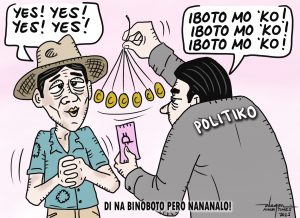IN AN earlier column, we wrote about another kind of battle fought as a consequence of the raging political war expected to cap by the May 2025 elections.
As we said then it is the battle of figures – estimated or actual – during campaign rallies by either the administration-backed candidates or the ones aligned with former President Rodrigo Duterte’s PDP-Laban.
In the first three major sorties of the administration alliance, the other group – now the main opposition, did not have even an iota of a qualm in describing the rallies as “gilangaw.” It means that the attendees can hardly be considered a crowd.
Meanwhile, the administration trumpeters have also been describing the PDP-Laban rallies as “kakarampot” in attendance.
The two political nemeses, however, have one thing in common – they both showed drone-captured photos of their crowd indicating that they have what it takes to intimidate each other.
But of course, the final arbiter as to which group has bigger crowds will be the result of the elections. So let us not allow our patience to thin for the moment and wait until after the elections in May.
*******************************
Again for the past few weeks, there were a number of news reports about confiscations of smuggled cigarettes and arrests of people transporting illegal drugs to the city worth millions of pesos, and drug buy-busts. The latest was the one confiscated at the Sirawan composite checkpoint.
Is this surge in drug busts and smuggling attempts to the city indications of a breakdown in safety and security measures? What is its implication on the accolade given to Davao City as the Number 2 safest city to live in the whole of Southeast Asia?
Is this situation in Davao’s peace and order for real? Could this be a part of what the top local civilian officials of the city insinuated as some kind of “orchestration” by forces or groups out to discredit the
Davao’s prestige and the credibility of its current leaders?
Or, is this situation showing an upsurge of illegal activities an offshoot of the enmity between the country’s top politicians? One is led by Davaoeños in former President Rodrigo Duterte and his children Vice President Sara and her two brothers Mayor Baste and Congressman Pulong. Their adversary is the group headed by no less than the incumbent President Ferdinand R. Marcos, Jr. and cousin Speaker Martin Romualdez.
It is no secret that the political squabble between the opposing groups led to a series of controversies that happened right in Davao City. First, there was the manhunt of now detained religious leader Rev. Apollo C. Quiboloy. Then there was a series of changes in directorship at the city’s police office that somehow ended with the designation of its current acting director Col. Hansel Marantan.
And if we remember it right there was one news report about Mayor Baste expressing apprehension of the possibility of a “scripted” rise in crimes and other illegal activities that may happen in the city allegedly to destroy the image it now has.
Of course, our take on the claim is that it could only be a result of the unmitigated anger of the mayor on what was then transpiring in the city. And the possibility is not remote that the mayor and the police director may have already talked with all sincerity and sorted out the matter.
Unfortunately, however, this rapprochement has still not happened. We are saying this after we read a social media post while still finalizing this piece. The post came from the Office of the City Police Director explaining a Memorandum Circular regarding the augmentation of the Presidential Security force assigned to guard the President who was in a political rally in Carmen, Davao del Norte three days ago. The President, now a hated opponent of Davaoeno former President Duterte, came to that Carmen rally to endorse his team’s senatorial candidates.
A copy of the Memorandum Circular was circulated through social media seemingly insinuating the police’s political bias. That was when Colonel Marantan had to post his clarification.
But we still think it is to the Davaonos’ advantage if the police director and the mayor will sit down and put an end to what appears as the “to each his own” approach in dealing with the city’s safety and security.
Any photo documentation of such a meeting released to the media is far from enough to assuage the Davaoeños’ anxiety. They must issue a joint statement of their coming together.


